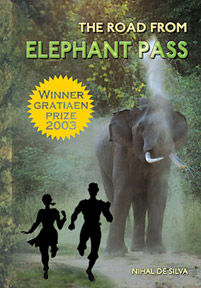|
‘The emotion of art is impersonal’:
The process of depersonalization
 We ended last time's discussion of Eliot's Objective Correlative
theory by looking at it in the light of Shakespeare's definition of
Imagination's role in the creative process. This, interestingly, was
even more of an ‘obiter dictum’ than Eliot's, being thrown up in the
course of the dramatic action of a play. The remarkableness of
Shakespeare's insight, and foresight, is aptly described by Owen
Barfield in ‘History in English Words': We ended last time's discussion of Eliot's Objective Correlative
theory by looking at it in the light of Shakespeare's definition of
Imagination's role in the creative process. This, interestingly, was
even more of an ‘obiter dictum’ than Eliot's, being thrown up in the
course of the dramatic action of a play. The remarkableness of
Shakespeare's insight, and foresight, is aptly described by Owen
Barfield in ‘History in English Words':
“In such a passage we seem to behold him standing up, a figure of
colossal stature, gazing at us over the heads of the intervening
generations. He transcends the flights of time and the laborious
building up of meanings and, picking up a part of the outlook of an age
which is to succeed his by nearly two hundred years, gives it momentary
expression before he lets it drop again.
That mystical conception which the word embodies in these lines—a
conception which would make imagination the interpreter and part creator
of a whole unseen world—is not found again until the Romantic Movement
has begun.”
Famous definitions
It is strange that Eliot's own theory makes no mention of Imagination
even though the Romantic Movement and Coleridge's famous definition
preceded his by over a hundred years. In fact, as noted last time,
Eliot's version makes the creative process look rather like a scientific
one. Indeed, it is reminiscent of another of his pronouncements which he
actually explains in scientific terms. This is found in his most famous
essay, ‘Tradition and the Individual Talent'. Speaking of the ‘process
of depersonalization’ whereby ‘art may be said to approach the condition
of science’, he invites us to consider the role of the catalyst in
chemistry and draws this analogy:
 |
|
Nihal de
Silva |
 “When the two gases (oxygen and sulphur dioxide) are mixed in the
presence of a filament of platinum, they form sulphuric acid. This
combination takes place only if the platinum is present; nevertheless
the newly formed acid contains no trace of platinum, and the platinum
itself is apparently unaffected: it has remained inert, neutral, and
unchanged. “When the two gases (oxygen and sulphur dioxide) are mixed in the
presence of a filament of platinum, they form sulphuric acid. This
combination takes place only if the platinum is present; nevertheless
the newly formed acid contains no trace of platinum, and the platinum
itself is apparently unaffected: it has remained inert, neutral, and
unchanged.
The mind of the poet is the shred of platinum. It may partly or
exclusively operate upon the experience of the man himself; but, the
more perfect the artist, the more completely separate in him will be the
man who suffers and the mind which creates; the more perfectly will the
mind digest and transmute the passions which are its material.”
Eliot goes on to speak of ‘significant emotion’, namely the ‘emotion
which has its life in the poem and not in the history of the poet. The
emotion of art’, he concludes, ‘is impersonal.’ The resulting concept of
the impersonality of true poetry has, needless to say, been tediously
overworked.
It hardly, for instance, holds good in the face of Shakespeare's
sonnets, most of Wordsworth's poetry and Eliot's own ‘Four Quartets'.
These surely represent the intensely personal experiences of the poets
themselves as presented directly to us. The notion of impersonality
seems quite inappropriate here. Yet, we cannot afford to throw out the
baby with the bath-water.
Substitute the word ‘detachment’ for impersonality, and the
desirability of there being a measure of detachment between the artist
and his work of art will be readily acknowledged. And if truth be told
such detachment is even to be found in the aforementioned works.
In these poems Wordsworth and Eliot are each, undoubtedly, ‘a man
speaking to men’ in accordance with the former's idea of what a poet
should be. Shakespeare, too, is obviously speaking to us as well as
addressing the objects of his devotion.
Yet all three achieve that necessary degree of detachment through the
imaginative use of situation and imagery. In the Sonnets the experience
of unrequited devotion becomes the occasion for profound thoughts about
life and death, time and permanence, love and lust, which absorb us more
than the actual experience of ‘the man who suffers'.
And while ‘Tintern Abbey’ is all about Wordsworth's deepening
awareness of nature's influence, nature itself becomes for us as well as
for him ‘a presence that disturbs'; it is through his evocation of that
presence rather than through his ‘elevated thoughts’ that we share the
‘joy’ of them, that indefinable ‘sense sublime.’
As for ‘Waste Land’, Eliot's profound meditations on time past,
present and future are distanced from himself by their association with
the locations that provide the titles of the four quartets, ‘Burnt
Norton’ etc., and by the myriad ancillary images these engender, eg. the
rose garden, the river etc.
Greater credence
Thus, even if you cannot talk about impersonality here the existence
of an ‘art emotion’ is undeniable. And when we range further afield the
idea of impersonality itself gains greater credence. What is personal,
for instance, about Keats ‘Ode to Autumn’, Wallace Stevens’ ‘Anecdote of
the Jar’ and Alfreda de Silva's ‘Stone Girl in an Indian Garden'? They
seem pretty impersonal for all that they are moving or
thought-provoking. And it is here that the theory of the objective
correlative makes its presence felt.
It is seen to be bound up with the process of depersonalization and
the production of the art emotion. Autumn becomes a symbol of the idea
that ‘change is the mother of beauty'. The jar seems to embody, inter
alia, the restrictive effects of the civilizing process and the
philosophizing tendency. The retold legend of the stone girl is a
frightening revelation of man's latent animalism. And when you look back
you see that the objectivity of these poems has been achieved through a
superb choice of correlatives for the subjective realities they
represent.
But we must remember that Eliot spoke of the objective correlative in
writing about a play, Shakespeare's ‘Hamlet'. And it is in the realms of
drama and fiction that the concept takes on an even greater relevance.
As we have discussed earlier a novel is not effective unless it has the
feel, gives the illusion, of real life. For this purpose its social
context, its characters and their relationships and its story or plot
are essential. So are these essential for drama, though here context
becomes less important and plot more so.
And it is these indispensable ingredients of fiction and drama that
provide the ‘set of objects, situations and chains of events’ that
function as objective correlatives to the subjective issues under
consideration.
When these correlatives are imaginatively conceived the experience of
the play or the novel moves into a dimension of impersonality; and
thence into one of universality. The artist has succeeded in embodying
his ideas and passions in his plot and characters, thereby transmuting
them into something rich and strange.
Thus Emily Bronte's yearning for romantic love and her adoration of
the earth are convincingly incorporated in the person of Cathy. And what
happens to the latter in the story shows her understanding of the
consequences of indulging these passions to an extreme.
It is the experience of Cathy, not of the author, that captures our
imagination, and this is because of the chain of events and the
situations in which Cathy moves and suffers. And in ‘The Road from
Elephant Pass’ Nihal de Silva's choice of the civil war as his context
and a credible escape story arising therefrom as his plot is what
enables him to objectify his hatred of prejudice and his longing for
brotherhood among the races.
‘Elephant Pass’ has been dismissed by some as an adventure story for
schoolboys. This is because they have failed to realise that the literal
adventure is the objective correlative of the greater adventure of the
development of a loving relationship between two deadly enemies: and
that the way this relationship develops is itself the objective
correlative of how, through mutual knowledge and understanding, the
rapprochement that is desired on a universal scale might be achieved.
For such critics ‘a hawk’ in Pound's words, ‘is a hawk'. But their
misjudgment too is a vindication of Eliot's theory!
Personal friendships
Turning to drama, Shakespeare finds in the events preceding and
following the assassination of Julius Caesar an objective correlative
for his thoughts about the difficulty of reconciling personal friendship
and commitment to the general good when the two loyalties came into
conflict; also the trauma that ensues when the high-minded soul is
persuaded to adopt questionable means to achieve an ideal. ‘Julius
Caesar’ is often linked with ‘Hamlet’ for its depiction of a hesitant
hero, Brutus, and for its profusion of compelling speeches. Our
reference to it, therefore, is is an appropriate prelude to our taking
up for consideration Eliot's contention that ‘Hamlet’ is an artistic
failure.
|







